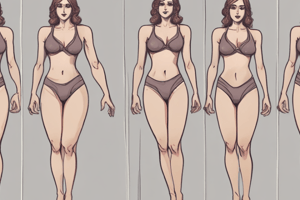Podcast
Questions and Answers
Which body type is characterized by having wider hips and a rounder physique?
Which body type is characterized by having wider hips and a rounder physique?
- Hyperthroph
- Endomorph (correct)
- Ectomorph
- Mesomorph
What factor is least likely to influence an individual's physique?
What factor is least likely to influence an individual's physique?
- Diet
- Occupation (correct)
- Social media trends
- Genetics
Which of the following is NOT a type of physique classification?
Which of the following is NOT a type of physique classification?
- Mesomorph
- Endomorph
- Ectomorph
- Aesthetic Morph (correct)
Which approach is primarily aimed at achieving muscle gain?
Which approach is primarily aimed at achieving muscle gain?
Which measurement tool is used to evaluate body composition?
Which measurement tool is used to evaluate body composition?
What is a common characteristic of the mesomorph physique?
What is a common characteristic of the mesomorph physique?
Which statement about resistance training is accurate?
Which statement about resistance training is accurate?
Which of the following is a psychological factor that can be influenced by physique?
Which of the following is a psychological factor that can be influenced by physique?
Flashcards are hidden until you start studying
Study Notes
Physique
-
Definition: Refers to the form, size, and development of an individual’s body particularly in relation to muscle and fat distribution.
-
Types of Physiques:
- Ectomorph:
- Characterized by a slim build
- Narrow shoulders and hips
- Difficulty gaining weight and muscle mass
- Mesomorph:
- Muscular and well-proportioned
- Broad shoulders, narrow waist
- Easier to gain muscle and lose fat
- Endomorph:
- Rounder physique with higher body fat
- Wider hips and larger bone structure
- Often struggles with weight loss
- Ectomorph:
-
Factors Influencing Physique:
- Genetics: Plays a significant role in body type and muscle distribution.
- Diet: Nutrition affects body composition and overall physique.
- Exercise: Type, frequency, and intensity influence muscle growth and fat loss.
- Lifestyle: Sleep, stress, and overall health can impact physique.
-
Body Composition:
- Refers to the ratio of fat to lean mass in the body.
- Tools for measurement include BMI, body fat percentage, and muscle mass analysis.
-
Physique Development:
- Resistance Training: Enhances muscle growth and definition; varies based on goals (e.g., strength vs. hypertrophy).
- Cardiovascular Exercise: Important for fat loss and overall cardiovascular health; aids in maintaining a healthy physique.
- Nutrition: Balancing macronutrients (carbs, proteins, fats) is crucial for supporting training and recovery.
-
Fitness Goals:
- Muscle Gain: Focus on resistance training and higher caloric intake.
- Fat Loss: Prioritize cardio, strength training, and a caloric deficit diet.
- Maintenance: Balanced diet and regular exercise to sustain desired physique.
-
Aesthetic Goals: Many individuals pursue specific physiques for aesthetic purposes, including bodybuilding, fitness competitions, and modeling.
-
Mental and Emotional Aspects:
- Body image and self-esteem can be significantly influenced by physique.
- Healthy approach includes focusing on performance and well-being rather than appearance alone.
-
Trends and Culture:
- Societal standards of beauty and fitness alter perceptions of the ideal physique.
- Influence of social media and celebrity culture on body image ideals.
-
Health Implications:
- Certain physiques can predispose individuals to specific health risks (e.g., high body fat can lead to metabolic syndrome).
- A balanced approach focusing on health rather than just appearance is vital.
Physique
- Definition: Refers to the body's form, size, and development, particularly in relation to muscle and fat distribution.
Types of Physiques
- Ectomorph: Slim build, narrow shoulders and hips, difficulty gaining weight and muscle mass.
- Mesomorph: Muscular and well-proportioned, broad shoulders, narrow waist, easier to gain muscle and lose fat.
- Endomorph: Rounder physique with higher body fat, wider hips and larger bone structure, often struggles with weight loss.
Factors Influencing Physique
- Genetics: Plays a significant role in body type and muscle distribution.
- Diet: Nutrition affects body composition and overall physique.
- Exercise: Type, frequency, and intensity influence muscle growth and fat loss.
- Lifestyle: Sleep, stress, and overall health impact physique.
Body Composition
- Refers to the ratio of fat to lean mass in the body.
- Tools for measurement include BMI, body fat percentage, and muscle mass analysis.
Physique Development
- Resistance Training: Enhances muscle growth and definition; varies based on goals (strength vs. hypertrophy).
- Cardiovascular Exercise: Important for fat loss and overall cardiovascular health; aids in maintaining a healthy physique.
- Nutrition: Balancing macronutrients (carbs, proteins, fats) is crucial for supporting training and recovery.
Fitness Goals
- Muscle Gain: Focuses on resistance training and a higher caloric intake.
- Fat Loss: Prioritizes cardio, strength training, and a caloric deficit diet.
- Maintenance: Balanced diet and regular exercise to sustain desired physique.
Aesthetic Goals
- Many individuals pursue specific physiques for aesthetic purposes, including bodybuilding, fitness competitions, and modeling.
Mental and Emotional Aspects
- Body image and self-esteem can be significantly influenced by physique.
- A healthy approach focuses on performance and well-being rather than appearance alone.
Trends and Culture
- Societal standards of beauty and fitness alter perceptions of the ideal physique.
- Influence of social media and celebrity culture on body image ideals.
Health Implications
- Certain physiques can predispose individuals to specific health risks (e.g., high body fat can lead to metabolic syndrome).
- A balanced approach focusing on health rather than just appearance is vital.
Studying That Suits You
Use AI to generate personalized quizzes and flashcards to suit your learning preferences.



